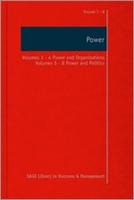Power theory, as a burgeoning field of study, has had, and continues to have, a huge impact across the social sciences. In particular, there has been considerable innovative work in the fields of organization studies and politics which in turn has fed research in a wide array of related fields, such as public administration, cultural studies, management and democratic theory. However, work on power is sprawling and seemingly eclectic - this Eight-Volume Set combines Power and Politics, along with the companion set Power and Organizations, to take stock of the theory by reviewing its foundations, current status and emerging new directions in both organization studies and political theory.
While there is evident synergy and cross-fertilization across the fields of organization studies and political theory, through the impact of work by figures such as Lukes, Bourdieu, Foucault, Haugaard, Clegg, Dean, Allen and others, there is sufficient distinction to warrant two separate but related collections.

